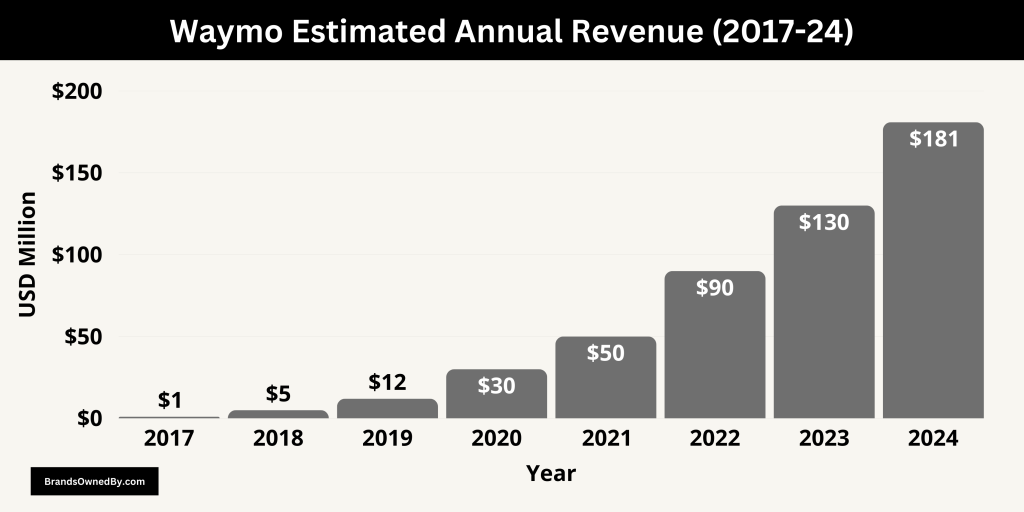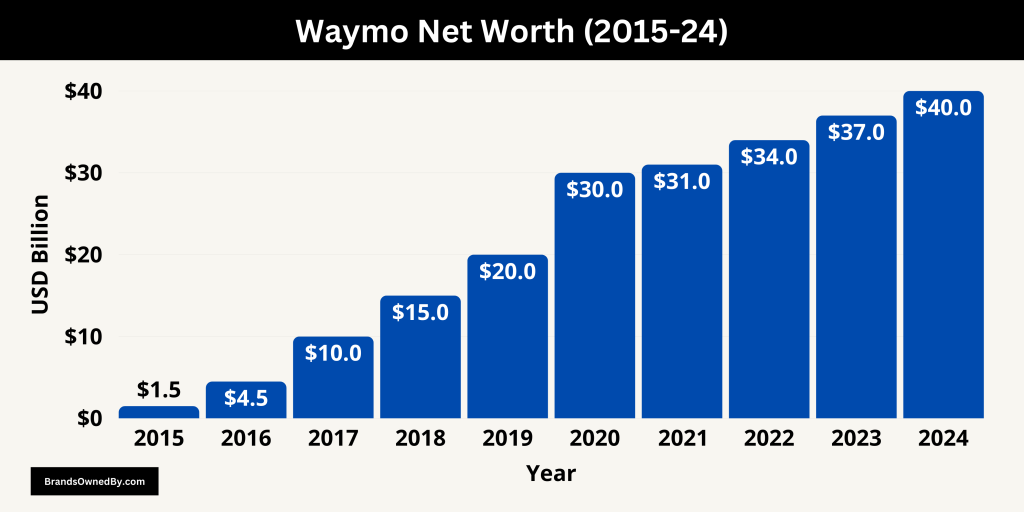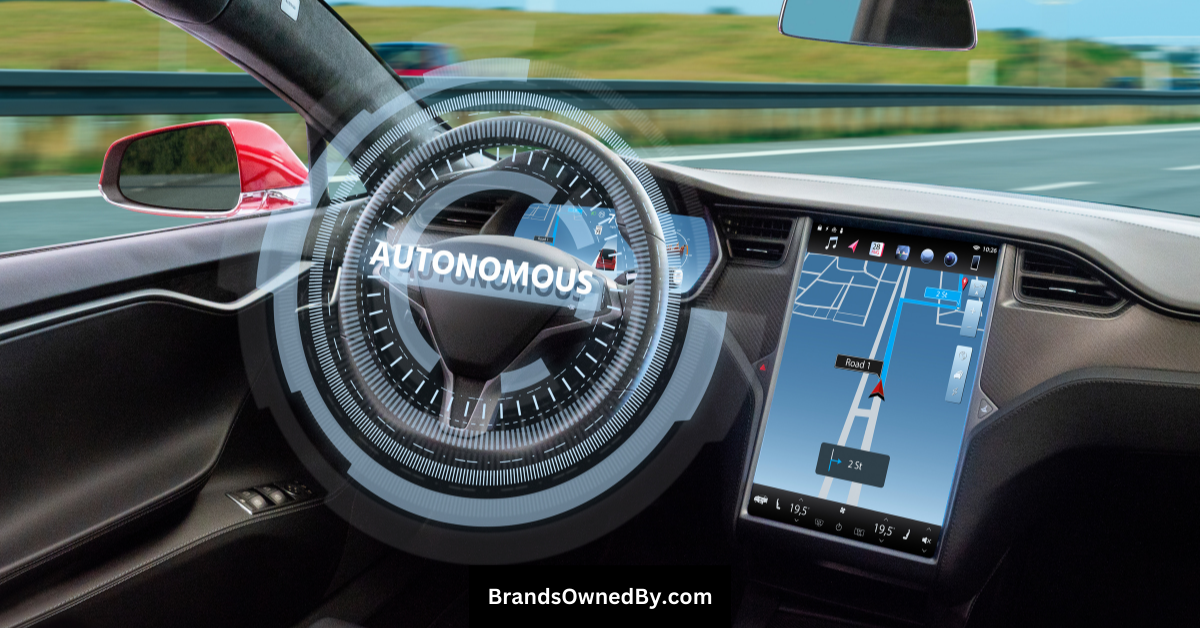Waymo is one of the leading names in the autonomous vehicle industry. With increasing attention on self-driving technology, many are now asking, who owns Waymo? The answer lies in its ties to one of the biggest tech companies in the world, but there’s more to the story. This article provides a detailed breakdown of Waymo’s ownership, structure, financials, and affiliated companies.
History of Waymo
Waymo started in 2009 as a project within Google. It was called the Google Self-Driving Car Project. The goal was to develop fully autonomous vehicles that could reduce accidents and improve transportation.
In 2016, the project became a separate company under Alphabet Inc. and was renamed Waymo, short for “a new way forward in mobility.”
Since then, Waymo has developed autonomous driving technology used in both passenger vehicles and delivery vans. It launched its first public ride-hailing service using self-driving cars in 2018 in Phoenix, Arizona. The company has continued expanding its technology and partnerships ever since.
Who Owns Waymo in 2025?
Waymo is wholly owned by Alphabet Inc., the parent company of Google. It is not an independent, publicly traded entity, and all of its shares are held privately under Alphabet’s corporate structure. This means all funding, strategic direction, and executive oversight come from Alphabet.
Parent Company: Alphabet Inc.
Alphabet Inc. was formed in 2015 as part of Google’s corporate restructuring. The idea was to separate its core internet businesses from its more experimental ventures, such as autonomous vehicles, biotech, and other long-term innovation projects. Waymo became one of the first “Other Bets” companies under this new structure.
Alphabet Inc. trades publicly on the NASDAQ under tickers GOOG and GOOGL. Investors in Alphabet indirectly own a share of Waymo through their holdings, although they have no direct claim or specific voting rights related to Waymo itself.
Acquisition and Formation Insights
Waymo was not acquired from another company; it was built internally by Google’s team. It started in 2009 as the Google Self-Driving Car Project, led by engineers including Sebastian Thrun and Chris Urmson. Over the years, the project evolved through extensive R&D, road testing, and partnerships with automakers.
In 2016, the project was spun off into a separate company called Waymo, short for “a new way forward in mobility.” It was placed under Alphabet’s “Other Bets” division, which houses high-risk, high-reward ventures.
Although Waymo has brought in external funding—such as a $3.2 billion funding round in 2020 from investors like Silver Lake, Andreessen Horowitz, and AutoNation—Alphabet has retained full ownership. These outside investments were structured as capital injections, not equity stakes that dilute Alphabet’s ownership.
Internal Ownership Structure
Within Alphabet, Waymo’s strategic oversight comes from Alphabet’s executive leadership and board. Key figures such as:
- Sundar Pichai, CEO of Alphabet
- Ruth Porat, CFO of Alphabet
- Larry Page and Sergey Brin, co-founders and holders of Class B shares with super-voting rights
…have a significant say in Waymo’s funding, direction, and long-term mission.
Waymo itself does not have a board of directors or an independent governance structure. It reports directly to Alphabet’s management team, making it a tightly integrated part of the conglomerate.
Alphabet Shareholder Influence
While Alphabet owns Waymo entirely, its shareholders hold indirect influence. These include:
- Larry Page and Sergey Brin: Through their Class B shares, they retain majority voting control over Alphabet and its subsidiaries.
- Institutional investors: Firms like Vanguard Group, BlackRock, and Fidelity own large amounts of Alphabet’s Class A shares. They influence decisions through shareholder voting and activism, although their control is limited compared to founders.
This layered structure means that decisions about Waymo—such as funding rounds, partnerships, or IPO plans—are ultimately made by Alphabet’s top executives and approved by its board.
Potential IPO and Ownership Changes
Over the years, there has been speculation about Waymo potentially going public or being spun off. However, Alphabet has kept it private so far, likely due to the long time horizon needed for autonomous driving to become profitable.
Some analysts believe Alphabet may eventually issue a tracking stock for Waymo or conduct a partial spin-off IPO if the company becomes revenue-positive. Until then, Alphabet will remain its sole shareholder.
Who is the CEO of Waymo?
Waymo is led by a co-CEO structure, a relatively rare model in the tech industry. As of 2025, Tekedra Mawakana and Dmitri Dolgov continue to serve as the co-Chief Executive Officers of Waymo.
Tekedra Mawakana: Co-CEO, Business and Operations
Tekedra Mawakana oversees the business side of Waymo. Her responsibilities include:
- Corporate strategy
- Public policy and regulation
- Partnerships and commercial operations
- Legal affairs and communications
She brings a background in law and public policy, having previously served as Chief Operating Officer at Waymo and held leadership roles at AOL and Yahoo. Mawakana ensures Waymo’s technology translates into scalable commercial services like Waymo One and Waymo Via.
Dmitri Dolgov: Co-CEO, Technology and Engineering
Dmitri Dolgov manages the technical direction of Waymo. His role includes:
- Development of the Waymo Driver technology
- Autonomous software systems
- AI and machine learning applications
- Long-term research and innovation
Dolgov is a robotics expert and one of the founding engineers of Google’s self-driving car project in 2009. His deep technical expertise keeps Waymo on the cutting edge of autonomous vehicle technology.
Why a Co-CEO Model?
Waymo adopted the co-CEO model in April 2021, following the resignation of then-CEO John Krafcik. This structure was intended to balance business execution with technical leadership. As of 2025, the co-CEO structure remains in place and has enabled a dual focus on commercialization and R&D.
Past CEOs of Waymo
- John Krafcik (2015–2021): Former CEO of Hyundai Motor America. He led Waymo during its transition from a project to a commercial company.
- Chris Urmson (Project lead pre-Waymo): Helped launch Google’s self-driving project before founding Aurora.
- Sergey Brin (oversight role): Provided executive support during the early Google X days when Waymo was part of Google’s experimental arm.
Who Controls Waymo?
Waymo is not controlled by its CEOs alone. As a wholly owned subsidiary of Alphabet Inc., ultimate control over Waymo resides at the Alphabet corporate level.
Alphabet Executive Oversight
Key executives at Alphabet who influence Waymo’s direction include:
- Sundar Pichai, CEO of Alphabet Inc.: Holds top-level authority over all Alphabet companies, including Waymo. He sets strategic priorities and allocates investment across the portfolio.
- Ruth Porat, President & CFO of Alphabet and Google: Manages capital distribution and financial oversight. She ensures that Waymo receives adequate resources and meets fiscal expectations.
- Alphabet Board of Directors: Responsible for corporate governance, including long-term investment strategies in emerging sectors like autonomous driving.
Founders’ Influence Through Super-Voting Shares
Although Larry Page and Sergey Brin stepped back from day-to-day operations in 2019, they retain majority control over Alphabet through Class B shares, which carry 10 votes per share. This gives them outsized influence over decisions such as:
- Continued funding for Waymo
- Acquisition or spin-off considerations
- Major leadership changes within subsidiaries
Their control ensures that long-term, visionary projects like Waymo can continue without short-term pressure from public markets.
Strategic Decision-Making
Waymo’s major decisions—such as expanding into new markets, forming automotive partnerships, or launching services like Waymo One—are aligned with Alphabet’s broader goals. These decisions are typically reviewed and approved by Alphabet’s executive team, with input from Waymo’s co-CEOs.
Annual Revenue and Net Worth of Waymo

In 2024, Waymo experienced substantial growth, driven by the expansion of its autonomous ride-hailing services in cities like Phoenix, San Francisco, Los Angeles, and Austin. Analysts estimated that Waymo generated approximately $180.9 million in revenue across these markets, marking a significant year-over-year increase.
This growth was fueled by increased ride volumes and strategic partnerships, notably with Uber, which integrated Waymo’s autonomous vehicles into its platform in select cities.
2025 Revenue Projections
Looking ahead, Waymo’s revenue is projected to continue its upward trajectory. Under a moderate growth scenario, the company is expected to achieve approximately $374.4 million in revenue for 2025. This projection is based on an estimated average of 400,000 weekly rides at an average fare of $18, sustained over 52 weeks.
These projections are supported by Waymo’s ongoing expansion into new markets and the scaling of its autonomous vehicle fleet. The company’s strategic partnerships and technological advancements are also anticipated to contribute to this growth.
Net Worth

As of May 2025, Waymo’s estimated valuation stands at approximately $45 billion, following a $5.6 billion funding round in October 2024.
This valuation reflects investor confidence in Waymo’s long-term potential, despite the company not yet achieving profitability. The high valuation is indicative of the significant growth expectations placed on the autonomous vehicle industry and Waymo’s leading position within it.
It’s important to note that these figures are based on available estimates and projections, as Waymo, being a subsidiary of Alphabet Inc., does not publicly disclose detailed financial statements.
Here is a table summarizing Waymo’s estimated historical revenue and net worth over the past 10 years, from 2015 to 2025:
| Year | Estimated Revenue (USD) | Estimated Net Worth / Valuation (USD) |
|---|---|---|
| 2015 | $0 (pre-commercial) | $1.5 billion (project phase under Google) |
| 2016 | $0 | $4.5 billion (spun off as Waymo) |
| 2017 | $1 million | $10 billion |
| 2018 | $5 million | $15 billion |
| 2019 | $12 million | $20 billion |
| 2020 | $30 million | $30 billion (Alphabet’s reported estimate) |
| 2021 | $50 million | $31 billion (after first external funding round) |
| 2022 | $90 million | $34 billion |
| 2023 | $130 million | $37 billion |
| 2024 | $180.9 million | $40 billion |
| 2025 | $374.4 million (projected) | $45 billion (latest valuation, post-2024 funding) |
Brands Owned by Waymo
As of 2025, Waymo, a subsidiary of Alphabet Inc., operates several key brands and initiatives that extend its autonomous driving technology across various sectors. These include ride-hailing services, freight logistics, and software platforms.
Below is an overview of Waymo’s primary brands and programs that it owns and operates:
| Brand / Initiative | Purpose / Function | Launch Year | Key Features and Activities |
|---|---|---|---|
| Waymo One | Autonomous ride-hailing service | 2018 | Driverless taxis in cities like Phoenix, SF, LA, Austin; ~250,000 weekly rides in 2025. Expansion to Atlanta, Miami, and D.C. planned. |
| Waymo Via | Autonomous freight and delivery logistics | 2020 (pilot) | Partners with Daimler Trucks and UPS; focused on long-haul trucking and package delivery using Class 8 trucks. |
| Waymo Driver | Core self-driving hardware + software platform | Internal use since 2009 | Integrated into Waymo One and Via; supports full autonomy using lidar, radar, and AI. Adaptable across vehicle types. |
| Waymo Open Dataset | Research dataset for AV development | 2019 | Provides annotated sensor data (camera + lidar) for public use in AI research and development. Widely used by universities and startups. |
Waymo One
Waymo One is Waymo’s flagship autonomous ride-hailing service. Launched in December 2018, it offers fully driverless rides to the public in cities like Phoenix, San Francisco, Los Angeles, Austin, and Miami. In 2024, the service completed over 4 million trips and currently operates more than 250,000 paid rides weekly. Waymo plans to expand to Atlanta, Miami, and eventually Washington, D.C., by 2026.
Waymo Via
Waymo Via is Waymo’s autonomous freight and delivery division. It focuses on integrating Waymo’s self-driving technology into Class 8 trucks for logistics and delivery services. Waymo Via has partnered with companies like Daimler Trucks and United Parcel Service (UPS) to develop and test autonomous freight solutions.
Waymo Driver
The Waymo Driver is the core autonomous driving technology developed by Waymo. It comprises hardware and software systems, including lidar, radar, cameras, and AI algorithms, enabling vehicles to navigate without human intervention. Waymo Driver is designed to be adaptable across various vehicle platforms and is being integrated into both ride-hailing and freight services.
Waymo Open Dataset
The Waymo Open Dataset is a publicly available collection of high-resolution sensor data collected by Waymo’s autonomous vehicles. It includes lidar and camera data, annotations, and maps, supporting research and development in autonomous driving technologies. The dataset is widely used by academic and industry researchers to advance machine learning and computer vision applications.
Conclusion
Waymo is a leader in self-driving technology and is fully owned by Alphabet Inc., Google’s parent company. While it began as an internal project, it has grown into a key part of Alphabet’s long-term mobility vision. The company remains privately held, with no direct public shareholders. However, anyone owning Alphabet stock indirectly shares in Waymo’s future. With a dual-CEO structure and ambitious goals, Waymo continues to shape the future of transportation.
FAQs
Is Waymo fully owned by Google?
No, Waymo is not owned by Google directly. It is a subsidiary of Alphabet Inc., which is the parent company of Google. While Google originally developed the self-driving car project in 2009, Waymo was spun off into its own company under Alphabet in 2016. Alphabet owns Waymo 100%, but it operates independently from Google within the Alphabet corporate structure.
Who is Waymo’s biggest competitor?
Waymo’s biggest competitor is Cruise, the autonomous vehicle company owned by General Motors (GM). Cruise also operates robotaxi services and is heavily funded by GM, Honda, and other partners. Other strong competitors include Tesla (with its Full Self-Driving software), Aurora Innovation, Motional, and Zoox (owned by Amazon).
Is Waymo a public or private company?
Waymo is a private company. It is not publicly traded and does not have its own stock. It is a subsidiary of Alphabet Inc., which is a public company listed under the stock ticker GOOGL or GOOG on the NASDAQ.
How much is Waymo worth?
As of 2025, Waymo is estimated to be worth around $45 billion. This valuation comes from investor estimates and recent funding rounds, including a $5.6 billion raise in 2024. While the company is not yet profitable, its valuation reflects high expectations for the future of autonomous driving.
Will Waymo ever make money?
Waymo is not yet profitable, but it is generating increasing revenue, especially from its Waymo One ride-hailing service. In 2024, it generated around $180.9 million, and it is projected to earn over $374 million in 2025. Profitability will depend on further scaling of operations, broader city deployment, and reduced costs of autonomous technology. Many experts believe it could become profitable in the next 5–7 years.
Is Waymo part of Google stock?
Indirectly, yes. Waymo is part of Alphabet Inc., which is the same company that owns Google. When you buy Alphabet stock (GOOGL or GOOG), you are investing in all of Alphabet’s companies, including Google, YouTube, Waymo, DeepMind, and others. However, there is no separate Waymo stock available.
Who owns the Waymo car company?
Waymo is fully owned by Alphabet Inc. The largest shareholders of Alphabet are its co-founders, Larry Page and Sergey Brin, who retain control through special Class B shares. Other major institutional investors in Alphabet include Vanguard Group, BlackRock, and Fidelity.
How much money has Google invested in Waymo?
While exact figures are not fully disclosed, analysts estimate that Alphabet (Google’s parent company) has invested over $10 billion in Waymo since its inception. This includes years of R&D, infrastructure development, and funding rounds. The 2021 and 2024 external raises ($2.5B and $5.6B respectively) helped boost its valuation, but Alphabet remains the primary funder.

